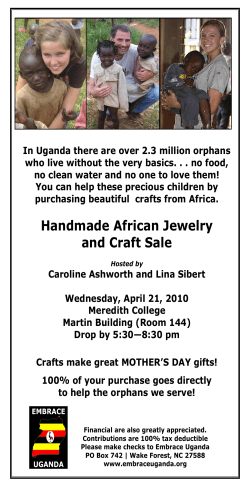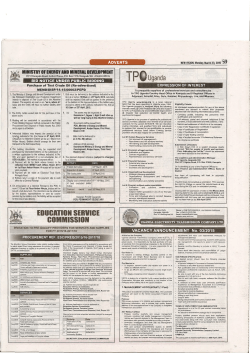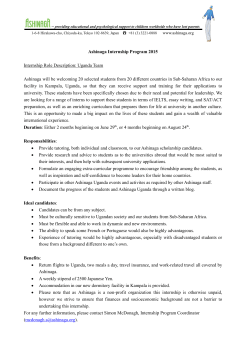
here - All Our Children
all our children Spring 2015 Newsle er No. 3 Meet Our Inspirational Ugandan Partners and A Sponsored Student Since we first visited Uganda in 2007, we have met some truly wonderful people! In this newsle er three of them tell their stories, our two Ugandan coordinators and one of our sponsored students who is about to qualify as a doctor. Other success stories from past sponsored students include Phillious Karibwige who has qualified as a barrister, Jack Barigira who now teaches compu ng at Kigezi High School and runs his own small technology business, James Bwambale who teaches biology and chemistry in three schools, acts as assistant manager at a new resort on Lake Bunyonyi and runs a small business in house pain ng and interior design, and our first sponsored student, Saidi Mbarakh, who has completed his MSc in plant breeding and gene cs and has been accepted for a PhD in the same field. An interview with a sponsored student, Stuart Turanzomwe “I was first sponsored in 2007 when I was in class S5; I was a boarder at Kigezi High School, as my home is about 30kms from Kigezi but within Kabale district. I liked school, I was more interested in my academic performance than in other issues and I was always good academically, but when you are in school and there is a problem about your fees ge ng paid it gets into your head and it is difficult to concentrate. Your mind is on other things. I needed sponsorship because my parents did not work and my dad is a polygamist. When an African man takes a second wife he tends to ignore the children of the first marriage. My mum tried to support me, but she was only working in fields and she had five children. She gave me moral support but it was very difficult for her to give much financial help. I am the second child, the firstborn is a lady and she did not get the chance to Connec ng with all our children: go to high school. The girlchild is being given more opportuni es now and even the government is trying to promote educa on for them. The sponsorship meant that I could think about my books rather than school fees. It was enough to make up for what I lacked, to cover the basics. I was good at maths and science and I thought about being an engineer, but by S6 I knew what I wanted to do. I took it as a calling because I knew that there are many people out there in the villages who are suffering from illness and I feel that as a doctor I can help. It is a calling from God. At A level I got 22 points when the maximum was 25 and these results gave me a government sponsorship to cover tui on fees which are expensive, around 3.4 million shillings per year (just under £1000). I was at Mbarara University for five years from 2009 to 2014 www.allourchildren.org.uk and I had good help with living expenses and the equipment I had to buy from my sponsor Charles through the charity. I am very thankful for the help I was given. I am now working as an intern in Lira Regional Referral Hospital and I will be a fully qualified doctor in four months. I will then be able to apply for jobs as a doctor and I think that I will first work in general prac ce.” A huge THANK YOU to all existing sponsors! @AOC_Uganda i/AOCUganda Why sponsorship is necessary to support children through education in Uganda Gertrude Atukunda explains Although the government of Uganda has a programme to provide Universal Primary Educa on (UPE) and Universal Secondary Educa on (USE), the funds provided are insufficient to cover all the costs associated with maintaining a student in school. The following details came from the deputy head of a USE school: “In 2014 the UPE grant per pupil per term was UGX 8,000 (£2) while it was UGX 47,000 (£12) for USE. This money is not expected to cover the costs of boarding at school (beds, food, water, electricity, medica on, wages of labourers e.g. cooks, matron, nurse). These have to be borne by the parents and so are included in the school fees. In addion, obviously all personal items needed by the student are provided by the parent. Poor parents cannot afford school fees and boarding costs. Even in schools that were iden fied as seed secondary schools, where the schools are expected to operate on government funds only with students residing in their homes, the funds are insufficient to run the schools (compounded by late releases of the funds). There are challenges faced by Above: Street children explore a newly arrived laptop at the ‘Educate a Child’ centre in Kabale students who reside in their homes, for example, walking long distances with associated risks especially for girls, inability to do private study in the evenings/night, and the s gma that goes with the a tude that such schools are for the poor. These schools are mainly found in rural areas and are o en disliked by parents since academic performance is usually not the best. Some teachers too tend to shy away from these schools due to lack of incen ves in the form of allowances.” costs associated with the educa on of children has to be met by parents. This situaon par cularly disadvantages children from poor families, especially orphans, who are not able to send their children to school due to lack of money. It is therefore important that such children should be iden fied and linked to sponsors who can assist them to attend school and live a normal life in future. Despite government financial support for educa on, the biggest por on of the Please help us sponsor Ugandan children We are a small charity run by volunteer teachers and re red teachers in the UK. From small beginnings in 2002 when we sponsored one student from fines imposed on sixth form students for using their mobile phones inappropriately, with your help we are now sponsoring 51 students across nursery, primary and secondary educa on. 31 of these children are from the Educate A Child-Street Children Uganda-Centre. On our annual visits we see for ourselves the lifeline that sponsorship gives to poor families, as we meet all the sponsored children. At the moment, we need dona ons to help us cover the costs for the exis ng sponsored students (as fees have increased) and to support the street children centre. Any amount of money, either as a one-off dona on or a regular payment will help. You can make a donaon or set up a direct debit on our website www.allourchildren.org.uk where you can also read our annual report and learn more about us. Above: Tamara, learning support assistant at William Morris, teaching maths at the street children centre Our Two Ugandan Coordinators The work of All Our Children is coordinated in Uganda by two truly inspiraƟonal people, Gertrude Atukunda in Kampala and Junior Tukwasibwe in Kabale. They support us by idenƟfying suitable children for sponsorship, paying the school fees of sponsored children each term aŌer we transfer the money from the UK, and monitoring the progress of the children in the various schools that they aƩend. But they mean much more than that to us! Both have a deep understanding based on personal experience of the challenges Ugandan families face in educaƟng their children and of the impact of poverty on life chances. All their lives they have made personal sacrifices to ensure that disadvantaged children have access to educaƟon. We are fortunate to be able to benefit from their wisdom and advice, and are in awe of their compassion and dedicaƟon. For their services we pay only basic expenses. Gertrude’s story Gertrude has a full- me job as a research socio-economist with the Na onal Agricultural Research Organisa on and is pursuing a PhD in Sociology at Makerere University in Kampala under a government programme funded by the World Bank to support agricultural research and extension. Her study focuses on improving advisory services to rural households engaged in fish farming to increase fish produc on. Her involvement with All Our Children is purely from personal interest and in her own me. Gertrude’s parents were both teachers; they had seven children of their own but also took into their home children from very poor families, most of them orphans unrelated to them. Her father could only aƩend school himself because he was supported by a village chief, and he in turn looked after children, some of whom became prominent public servants who aƩributed their success to him. Even now, their household of four surviving siblings sƟll provides for at least one disadvantaged child and all four siblings are involved in charity work. Gertrude became involved with the charity Solomon’s Children through Richard Vokes of Oxford University whilst he was doing research for his D.Phil in Uganda. He was close to Solomon, his driver in Kampala, who was caring for four children alone a er the death of his wife. When Solomon died of meningi- s, his children stopped a ending school for lack of fees. Back in the UK, Richard raised money for their fees. He later channelled extra money through Gertrude for other needy children, giving her the task of receiving, disbursing and accoun ng for the money. Thus Solomon’s Children was born. In 2010, Solomon’s Children changed its name to All Our Children when it encompassed sponsorships in Kabale, South West Uganda, run by William Morris Sixth Form in London. Gertrude agreed to con nue receiving and disbursing money, as well as monitoring the children sponsored by the original Solomon’s Children donors. Each year she joins us in Kabale where we benefit from her knowledge and authority as we jointly monitor the progress of our various projects. She also undertakes the long road journey to Kabale on other occasions on our behalf to support our coordinator there, Junior Tukwasibwe, who, like Gertrude, disburses and accounts for money we send for school fees. Junior’s story Junior studied Social Work and Social Administra on at Kabale University before taking up a voluntary unpaid post as a social worker at a street children centre. It was there that teachers from William Morris Sixth Form first met him. They were immediately impressed with his ability to relate to these very poor, vulnerable, and some mes abused children. His care for them was clear, as was his passion for helping them to gain educa on. Since then, All Our Children has helped him establish his own centre, Educate a ChildStreet Children-Uganda, and register it as an official Community Based Organisa on. He, his wife and his one year old daughter live in the small centre in which he supports nearly 70 street children. He runs this centre on love, his unfailingly posi ve and entrepreneurial outlook, and sheer determina on to improve the lot of the many children who choose to live on the street because home is so poor. By providing food for the children, he encourages them to come to the centre in the dayme where he organises ac vi es for them, and to return home at night. His aim is to find sponsors for all the children to a end school. Like Gertrude, Junior grew up knowing at first hand the struggle for school fees that dominates the lives of so many Ugandan families. The eldest (“first born”) of eight children, he did not complete primary school unƟl the age of 18, and secondary school unƟl he was 26, being constantly in and out of school because of shortage of money for school fees. From the age of 5 he was taking responsibility for his younger siblings, and from a very young age working to earn money for fees and food for his siblings. At university he was supported by friends as well as his own earnings. Clearly these experiences have made him into the strong, capable and deeply compassionate person that he is. Students from William Morris Sixth Form have called him an angel.
© Copyright 2025









